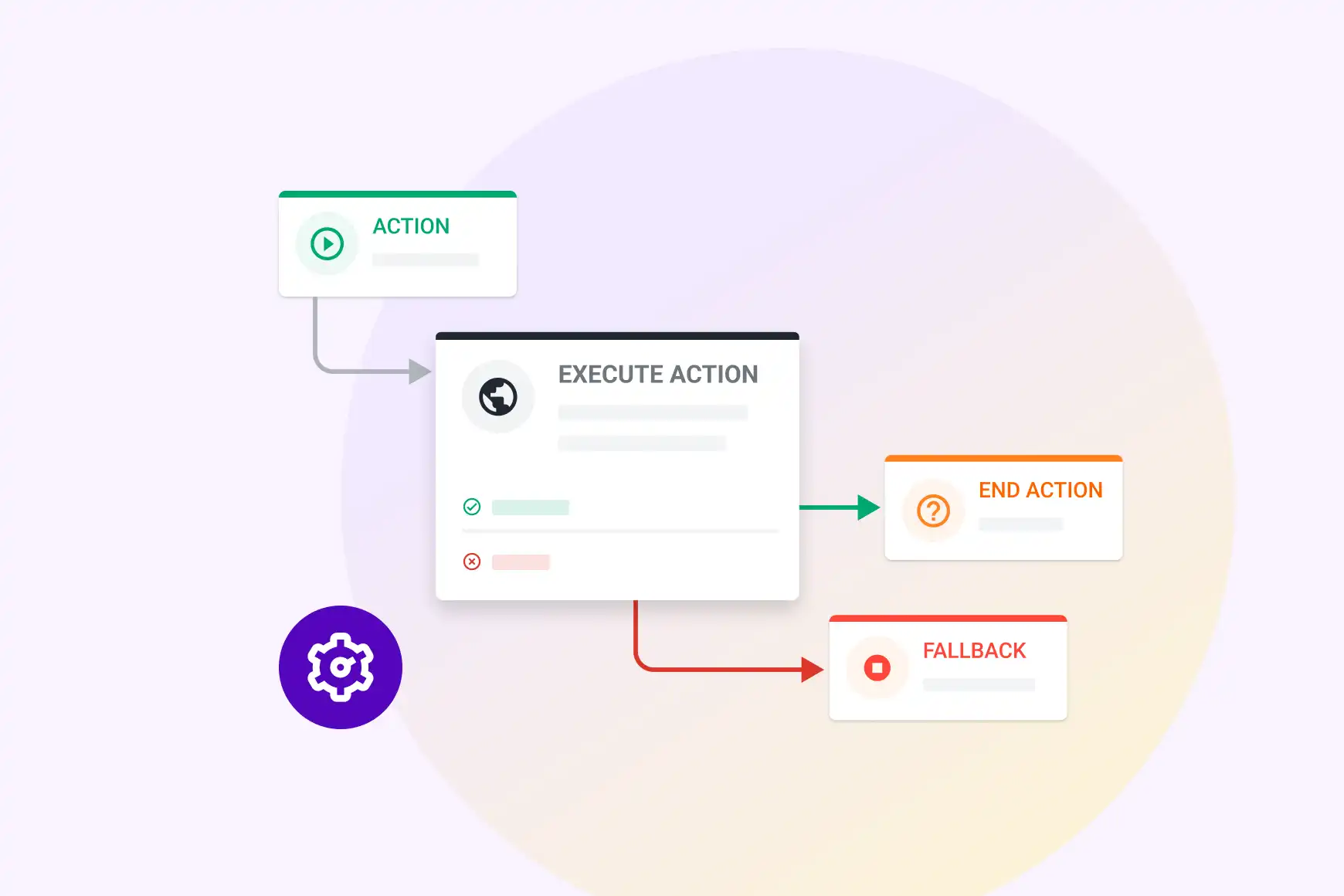AI in customer service: The ultimate guide

By Celia Cerdeira
0 min read

AI is reshaping customer service by setting a new standard for speed, personalization, and always-on support.
From tailored product recommendations to relevant content and seamless brand interactions, personalization has become the standard. That same expectation has long applied to customer service, where people want fast, frictionless support that feels effortless and intuitive. They expect not to repeat themselves when transferred between agents, to get help on the channels they prefer, and to have their issues resolved quickly—anytime, anywhere. Meeting these demands is what defines great customer service.
With the ability to collect and analyze customer data in real time, artificial intelligence (AI) can intelligently route requests, surface relevant information to agents, and automate routine tasks. This means customers get faster, more efficient support—and agents can spend more time helping people instead of chasing down information or completing post-call follow-ups.
In this blog, we’ll dive into how AI is transforming customer service, the benefits, and how to successfully implement it across a customer experience strategy.
What is AI in customer service?
AI in customer service refers to the use of advanced technologies—like agentic AI, machine learning, large language models (LLMs), and automation—to enhance how businesses serve their customers.
These AI tools can understand and respond to customer inquiries, anticipate needs based on past behavior, and help support teams work more efficiently. Whether it’s a chatbot answering a simple question or a system analyzing customer sentiment to escalate a conversation to a human agent, AI is designed to improve both speed and quality of service.
Most importantly, AI doesn’t replace human agents; it supports them. By automating repetitive tasks (like ticket tagging or pulling up order details), AI frees agents to focus on more complex, meaningful conversations. It also ensures that customers are connected to the right resources faster, reducing wait times and frustration.
What role does AI play in customer service?
AI helps companies meet rising customer expectations for fast, personalized service while reducing the burden on human agents. Check out six ways agentic AI is already enhancing customer support.
-
AI generates summaries to reduce post-interaction work. Rather than simply transcribing interactions, agentic AI actively monitors conversations and autonomously compiles concise summaries at the end of each interaction. This reduces the need for agents to manually document details, reducing interaction handle time and improving consistency in customer records.
-
AI analyzes customer sentiment. Agentic AI proactively monitors tone, language, and behavioral cues across channels to assess customer mood instantly. It can act on these insights immediately, such as escalating frustrated customers to a human agent or adjusting the tone of automated responses.
-
AI empowers virtual agents with conversational context. AI agents actively manage conversations, drawing on context, history, and intent to make decisions. If a customer’s issue evolves, AI can pivot accordingly.
-
AI promptly responds to customer reviews. Instead of waiting for human intervention, agentic AI monitors review platforms, identifies new feedback, and drafts timely, relevant responses to customer reviews.
-
AI powers knowledge bases. Agentic AI can maintain and improve knowledge bases by identifying gaps, updating outdated content, and surfacing the most relevant information during live interactions.
-
AI informs training materials for agents. Based on real-time performance data, agentic AI identifies where agents are struggling and proactively delivers customized training modules. It can assign microlearning tasks, update onboarding tracks, and even simulate coaching conversations—all without needing a manager to step in.
Companies are actively exploring how to best integrate AI into their customer experience (CX) strategies, aiming to optimize workflows without compromising the personal touch that customers value. While AI is effective at handling routine tasks, many customers still want the option to speak with a live agent when the issue is complex or sensitive. By automating repetitive interactions, AI reduces agent workload and wait times, making it easier for teams to deliver responsive, human-to-human service where it matters most.

ON-DEMAND WEBINAR
AI agents for self-service
Discover how AI Agents allows you to automate complex tasks with simple instructions, instead of complex workflows.
This webinar includes an exciting Demo showcasing the latest AI Agents for self-service. You will discover Talkdesk’s vision of an end-to-end customer service automation platform that deeply leverages Agentic AI across multiple personas and relevant to all industries.
Benefits of AI for customer service.
From reducing after call work to routing customers intelligently and responding to reviews in real time, AI can automate the repetitive and optimize the complex. Below are some of the most impactful benefits AI brings to customer service operations:
-
Elevate agent efficiency. By automating repetitive tasks and surfacing real-time insights, AI allows agents to spend more time solving problems and less time searching for answers.
-
Improve customer satisfaction. Faster response times, more accurate solutions, and a smoother overall experience lead to higher levels of customer satisfaction and loyalty.
-
Balance high demand. During spikes in support volume, AI virtual agents can reduce customer wait times.
-
Empower customers with self-service options. AI-powered self-service tools like chatbots and smart FAQs help customers quickly find answers on their own—without waiting in line for a live agent.
-
Enable 24/7 support availability. AI never sleeps, which means businesses can offer around-the-clock assistance to customers, no matter their time zone or schedule.
-
Deliver a proactive service experience. AI can tap into contracts, warranties, purchase history, and marketing data to surface timely, relevant next steps—from subscription renewals to maintenance reminders or upgrade offers.
-
Omnichannel capabilities. AI helps companies deliver on the promise of a truly omnichannel customer experience strategy. Customers can reach out via the communication channels they prefer—whether that’s live chat, phone, social, or email—and receive consistent, personalized support every time.
Examples of AI in customer service.
Let’s explore how AI can enhance customer service regardless of industry. Here are just a few examples:
Empower autonomous decision-making with AI agents.
AI agents respond to commands, observe, analyze, and act based on dynamic conditions and contextual data. Whether deciding how to prioritize incoming support tickets, identifying when to escalate a customer issue, or selecting the most appropriate self-service content, agentic AI speeds up operations by reducing delays and human bottlenecks.
AI agents can be linked into full-scale agentic workflows that handle end-to-end tasks across the customer service journey. For example, one AI agent might detect a drop in customer sentiment during a live chat, another could decide to escalate the conversation to a human agent, while a third drafts a follow-up email or logs a case for future reference. These workflows can be configured to learn and improve over time, enhancing their decision-making capabilities and impact. The benefit? A customer service operation that is proactive, responsive, and highly scalable.
Forecast, schedule and assign agents with AI-powered workforce management.
Workforce management has always been a balancing act, ensuring a business has the right number of agents, at the right time, with the right skills. AI takes a lot of the guesswork out of that process. When it comes to forecasting, AI analyzes historical trends like seasonal spikes, volume patterns, and even year-over-year changes to predict how many agents are needed to keep service levels high. Instead of spending hours crunching numbers manually, teams can rely on AI to deliver fast, accurate forecasts that help prevent understaffing and overstaffing.
With solid forecasts in place, AI also helps build smarter schedules. It factors in agent availability, skills, contract requirements, and calendar conflicts to create shifts that work for everyone. Then comes the trickiest part: assigning the right roles to agents. AI can evaluate each agent’s experience, strengths, and past performance to match them with the tasks best suited to their skills. The result? A smoother operation, a more motivated team, and a customer service experience that feels thoughtful and responsive, even during the busiest times.
Strengthen your knowledge base.
A strong knowledge base is one of the most valuable tools in a customer service toolkit. With AI, support teams no longer need to manually sift through documentation or guess which article fits a customer’s issue. Instead, AI delivers automated, context-relevant answers directly to agents or customers based on the inquiry’s intent, past interactions, or current context. Tools like Talkdesk Knowledge Creator let you publish these AI-generated answer cards instantly or author them manually when needed, with routing rules that ensure the right information reaches the right team.
AI also simplifies knowledge consolidation. With knowledge base connectors, you can unify content from various third-party platforms into a centralized system—eliminating silos and making it easier for agents (and AI systems) to find accurate, up-to-date information fast. Uploading FAQ files is just as seamless. For instance, Talkdesk Knowledge Management automatically converts those into usable answer cards, helping teams expand their content libraries without time-consuming manual input.
Improve the efficiency, scale, and quality of customer feedback.
AI transforms how companies collect, understand, and act on customer feedback—turning what was once a manual, time-consuming process into a dynamic, continuous loop. It starts with smarter survey creation. AI can help generate personalized, context-aware survey questions based on the customer’s recent interactions, purchase history, or support journey. It can also automate deployment across channels, ensuring surveys reach customers at the right moment for higher response rates and more relevant insights.
Plus, instead of sifting through spreadsheets or manually coding open-ended responses, AI quickly processes survey data and unstructured feedback to identify trends, pain points, and emerging opportunities. It can surface the most critical CX metrics—like customer satisfaction score (CSAT), net promoter score (NPS), and customer effort score (CES)—and even go further by highlighting the why behind those scores through sentiment analysis and natural language processing.
Provide real-time agent assistance.
What if all human agents had a knowledgeable assistant by their side during every interaction—one that could instantly surface answers, suggest next steps, and guide them through complex issues? That’s exactly what AI-powered live assistance makes possible. Rather than pausing to search for information or escalate a case, agents can get real-time support as they’re speaking with customers. AI listens to the conversation, understands the context, and provides timely, relevant suggestions to help agents respond quickly and accurately.
This live guidance helps reduce average handle time (AHT), increase first contact resolution (FCR), and improve agent confidence and customer satisfaction. It also ensures consistent service quality by making expert-level knowledge accessible to all agents. One example is Talkdesk Copilot, which delivers AI-powered assistance to agents during every customer conversation.
How to implement AI across a customer service environment.
Bringing AI into a customer service strategy starts with building a thoughtful, scalable foundation that aligns with a business’s goals, teams, and customer expectations. Here’s a step-by-step guide to implementing AI across a customer service environment:
-
Define goals. Start by identifying the key pain points or opportunities in a customer service operation. Whether the objective is to reduce wait times, improve self-service, lower operational costs, or boost customer satisfaction clearly defined goals will guide the AI strategy and provide benchmarks for measuring success.
-
Assess the current CX infrastructure. Businesses should take stock of their existing tools, workflows, and data systems. It’s important to consider how AI can integrate with current platforms—including CRM systems, knowledge bases, and communication channels—to enhance performance without disrupting core processes.
-
Choose the right AI capabilities. Selecting the most appropriate AI tools depends on a business’s goals—whether that’s improving response times, enhancing customer satisfaction, or streamlining support operations. Technologies like virtual agents, sentiment analysis, and knowledge management automation can help achieve those outcomes.
-
Start with a pilot program. Begin small by applying AI to a specific use case, such as automating post-call summaries. A controlled pilot can help businesses evaluate impact, gather feedback, and make adjustments before a full rollout.
-
Train the team. Ensure agents, supervisors, and admins understand how AI tools work and how they’ll support their roles. Training and change management are essential to adoption and long-term success.
-
Monitor performance and feedback. Use analytics dashboards and agent/customer feedback to track performance. Keep an eye on key performance indicators (KPIs) like handle time, resolution rate, and customer satisfaction to see how AI impacts service.
Exploring the future of AI in customer service.
AI is redefining every aspect of customer service, transforming it from a cost center into a strategic advantage. With the ability to analyze sentiment, predict customer needs, and automate routine interactions, AI provides actionable insights that drive better business decisions.
While human agents remain central to delivering exceptional service, AI equips them with the tools to resolve issues faster and deliver more personalized experiences.
Companies embracing AI are already seeing significant gains in efficiency, customer satisfaction, and operational performance.
-
Michaels, one of the largest arts and crafts retailers in North America, leveraged Talkdesk AI-powered solutions to transform their contact center. AI-assisted agents improved service levels by 89% year over year, while automation reduced post-call work by 93%, freeing agents to focus on high-value interactions.
-
Ouro, a Texas-based financial services company, uses Talkdesk AI-powered customer experience analytics to discover deep customer insights that reshape its CX strategy. By leveraging AI to analyze, store, and act on customer feedback, Ouro reduced average handling time and significantly improved first contact resolution.
-
Evara Health, a federally qualified health center serving over 60,000 patients annually, transformed its patient experience strategy with Talkdesk. By deploying Talkdesk Autopilot, Evara now automates 45% of call volume, significantly reducing wait times and allowing agents to focus on complex care needs. As a result, average handling time has dropped, and patient satisfaction has improved by nearly 120%, setting a new benchmark for healthcare accessibility and efficiency.
Harness the power of AI in customer service and performance with Talkdesk CXA.
AI customer service FAQs.
AI should act as a supporting force in customer service, enhancing efficiency while keeping human agents at the core of customer interactions. By automating administrative tasks such as data collection, and routine problem-solving AI allows agents to focus on complex issues. This balance improves both operational efficiency and customer satisfaction.
AI brings major benefits to customer service by making it faster, more efficient, and cost-effective. It helps support teams manage more inquiries by automating repetitive tasks, delivering real-time assistance, and tailoring training to each agent’s needs. Plus, with 24/7 coverage across all channels, customers can get help whenever they need it.
No—AI is designed to enhance, not replace human agents. While AI can handle repetitive tasks and automate simple interactions, customers still prefer human support for complex or sensitive issues.
AI makes agents more effective by acting like a smart assistant during every interaction. It can surface the right information in real time, suggest next best actions, and summarize previous conversations so agents have full context without digging through records. It also handles repetitive tasks like logging notes or tagging tickets, freeing agents to focus on complex, high-value conversations.
Organizations should start by identifying key areas where AI can make the biggest impact—like automating repetitive tasks, improving self-service, or supporting agents in live conversations. From there, they can roll out AI tools gradually, beginning with a small pilot before expanding. It’s also important for AI to integrate well with existing systems like CRMs and knowledge bases. Most importantly, teams should be trained to work alongside AI, so it enhances their performance rather than disrupts it.
The best AI tools for customer service are those that help teams work more efficiently while improving the customer experience. From chatbots and virtual agents to knowledge base automation and real-time agent assistance, these tools can streamline support, reduce wait times, and personalize every interaction. Talkdesk offers an AI-powered CX platform that brings all of these capabilities together, helping businesses deliver faster, smarter support.
AI will shape the future of customer service by making the job of human agents easier. By taking care of repetitive tasks, offering real-time insights, and helping with decision-making, AI gives agents more time to focus on what they do best: helping people. As agentic AI evolves, businesses will be able to automate even more complex workflows, predict what customers need before they ask, and deliver support across every channel without missing a beat.








